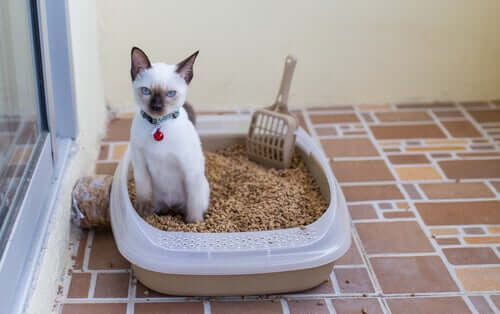Can a Cat and Baby Live Together Happily?


Written and verified by the lawyer Francisco María García
The arrival of a new family member is a bit more tricky when you’ve got a pet. But having a cat and baby live together doesn’t have to be as complicated as people might think. Getting your cat to adapt to your new baby basically depends on planning.
Cats are directly related to big cats, and they’re independent, dominant hunters. However, unlike wild animals, cats and dogs keep some of their childhood characteristics throughout adulthood.
This is what makes it possible to domesticate and train cats and dogs. The same can’t be said for big cats and wolves, which can’t be tamed. It’s their wild nature which allows them to survive.
The little touch of aggression that cats have retained is a fundamental part of their instinct, keeping them alert and mentally active.
But all things are possible with the right environment and a process of socialization, and it’s perfectly possible to ensure that your cat and baby live happily together.
How to socialize a cat with your baby?
Having a baby is a serious decision and requires preparation, and that includes for your pet too. The first golden rule is to socialize your cat before your baby arrives.
The socialization process teaches dogs and cats to live peacefully with other people and animals. This considerably decreases the risk of violent behavior when defending their territory.

The ideal time to start socializing your cat is between 4 and 20 weeks of age. This is when they start developing their first skills for living alongside others.
Don’t believe for a minute that cats don’t need to socialize just because they’re independent. Cats can behave aggressively when defending their territory or their owner, and they’re generally more territorial than dogs.
Simple tips to help your cat and baby live together happily
Never force your cat
Cats are more reserved and independent than dogs. This means that the process of getting them to interact with people and other animals is slower and more gradual.
It’s important to be patient and not force your cat to do anything against their will. Your cat will become more sociable in their own time. To help speed things up, you should make sure that they live in a quiet environment that they feel safe exploring.
Use physical and mental games
It’s really important for domestic cats to have an active life. This reduces anxiety and the chance of potentially aggressive behavior.
Our advice is to make use of games to help your cat’s physical and mental development. Cats are very intelligent and like to refine their senses. Start with toys that don’t require much physical contact to avoid scaring your cat, such as sticks, feathers, balls, etc.
Introduce other cats
Ideally, start by bringing a trusted cat into the home, but just for one or two hours. Definitely don’t force the two cats to interact. Over time, their curiosity will get the better of them. Then, you can bring new cats and let them share the same territory for one or two days.
The next step is to prepare the surroundings for your baby’s arrival and to ensure that the two can live together comfortably.
Here are 3 more fundamental pieces of advice for preparing your home to make sure your cat and baby live together happily.
Reinforced hygiene
The most important thing is to avoid any kind of contamination. There are many myths regarding cats and the passing on of diseases.
It’s important to be very careful regarding contact with cat urine or feces, particularly because your baby’s immune system is still developing.
Therefore, you need to keep good levels of hygiene throughout the home, but pay special attention to cleaning your cat’s sandbox every day.

Beware of excessive hairs and allergies
Your baby’s respiratory system is also still developing, so it’s important to avoid a build-up of cat hair, particular where your baby sleeps. Hairs can cause respiratory problems and skin allergies for newborn babies.
Respect your cat’s spaces
Cats are territorial and extremely hygienic. This why it’s important to keep their eating area and sandbox separate. Ideally, you shouldn’t radically change your cat’s routines because of your baby’s arrival. Instead, you should gradually get your cat used to the change.
This text is provided for informational purposes only and does not replace consultation with a professional. If in doubt, consult your specialist.